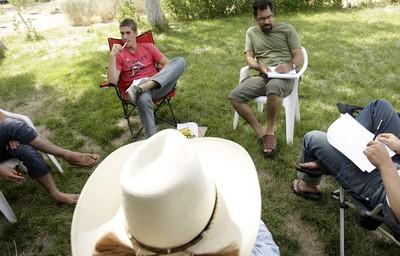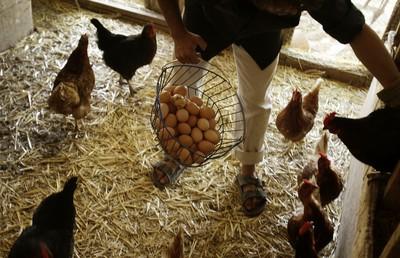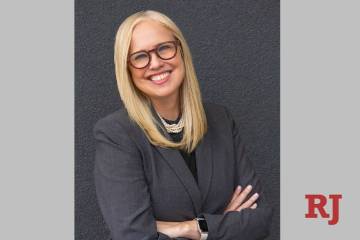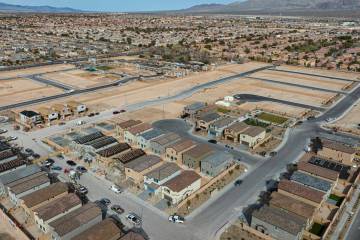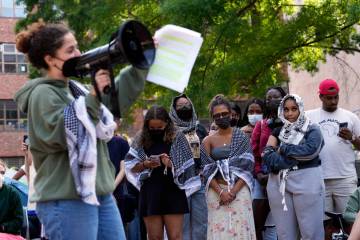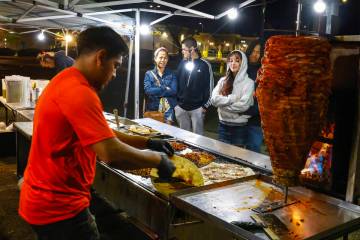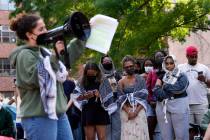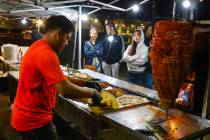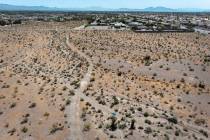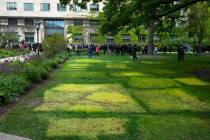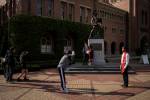LABOR’S LOVE NOT LOST
DEEP SPRINGS VALLEY, Calif.-- In this remote stretch of desert in eastern California, the young man who has to wake up early to milk the cows could have gone to Harvard.
Or Yale. Or Berkeley.
So could the fellow who has to move the water wheel lines over the dusty alfalfa field several times a day.
Or the one who rides on horseback to tend 300 head of cattle in the mountains near Death Valley.
Instead, almost all 26 students at the all-male Deep Springs College, a liberal arts school, turned down the country's best schools to go to a place where manual labor is sometimes considered more important than academics.
The college, in the Deep Springs Valley, is unusual not just because it's one of only a handful of colleges in the nation that remain all-male.
Located on hundreds of acres about an hour due east of Bishop, Calif., it's believed to be the only college in the United States that requires students to do manual labor.
Mornings are spent in the classroom, and the afternoon is devoted to assigned tasks -- everything from dishwashing to butchering livestock.
The student body is also self-governing, with students holding meetings to determine everything from who gets admitted, what courses are taught and which professors are chosen to teach them.
What the school offers is a break from their middle- to upper-middle class lives, a reprieve from the exhausting rat race of high school extracurricular activities and résumé-building.
"It sort of felt like I was on a conveyor belt to get a degree in four years and go out and get a well-paying job," said 20-year-old Max Hare, a Monterey, Calif., native who just graduated from Deep Springs. "I didn't want that."
He'll be attending Stanford this fall.
Students in the two-year program undergo a wide range of experiences and problems that they won't encounter anywhere else.
"It's just a rolling piece of problem-solving," said Gary Gossen, a visiting professor emeritus and former president at Deep Springs. "The idea that life is a piece of cake goes out the window here."
INTENTIONALLY REMOTE
Deep Springs College was intentionally located in the middle of nowhere, on hundreds of acres and a 30-minute drive from the Nevada-California border.
The school's founder, the late Lucien Lucius Nunn, wanted a place where students would be secluded from society, a place for personal reflection.
Nunn, a pioneer in electrical engineering whose company's greatest accomplishment was the design of the Ontario Power Plant at Niagara Falls, built an in-house education system to produce electrical engineers for mines throughout the West.
That effort later became the Telluride Association, a non-profit organization that continues to provide scholarships and free educational activities promoting Nunn's philosophy of self-governance and social responsibility.
He expanded on that philosophy by founding Deep Springs College in 1917 on the "three pillars" -- academics, labor and self-governance.
The school has largely remained the same since, with students maintaining a herd of cattle, an alfalfa farm, dairy cows, chickens, pigs, an orchard and a garden.
It's so remote that the school's mailing address is in nearby Dyer, over the Nevada border, and the school's most frequent visitor is the careless motorist who runs out of gasoline. Students will provide a small amount of gasoline in exchange for a donation to the school.
"It's a place full of folk tales," the college's just-retired president, Ross Peterson, said.
Because the school intentionally closes itself off to society, there are rumors in Bishop that the college is for "kids who killed their parents" and other bizarre misconceptions, Peterson said.
Attending takes a large amount of self-discipline, and many students and faculty said the school is not for those who can't be alone.
Students aren't allowed to leave the valley during the semester, and a no-alcohol policy is self-enforced.
There's no cable television, although marginally reliable Internet access is available.
Tuition and room and board is free for students, a $50,000 value paid for through endowments. Although there are no admissions requirements, the school is highly selective, taking 11 to 15 students each year out of the 200 or so who apply.
The school stresses the importance of a life of public service, and the most popular career fields for graduates are teaching in higher education and working in media as a writer, editor or publicist.
After students graduate from Deep Springs, their most popular destination to complete their four-year degree is Harvard, followed by the University of Chicago, Yale University and Brown University.
Despite the prestigious reputation of those schools, however, Deep Springs professor Katie Peterson, who is not related to the college's president, said she believes students are often disappointed after they transfer.
"And as well they should be," she added. "They'll never have an experience as honest or as thoughtful as they will have here."
CLASSES SMALL
Each student has a different story about what sold them on Deep Springs.
Some come simply for a change of pace. Others seek out the solitary, reflective nature of the desert.
For Los Angeles native Abram Kaplan, watching a cow being slaughtered on his first visit to the school sealed the deal.
As he and the students at the school lingered around the animal, a philosophical debate erupted about when the cow turned from an animal into a piece of meat.
Some felt the cow became meat when somebody decided it was going to be killed; others thought it stopped being an animal after it had died.
Kaplan said it was still an animal until it was cut into two pieces.
He was just visiting the school at the time, but the debate showed him the college was exactly the environment he was looking for.
That environment starts in the morning, in intimate classrooms of between five and eight students -- small enough that there's no place for students to hide if they haven't done their work.
Classes are heavy on discussion and debate in such topics as advanced molecular biology, energy and the environment, or "Herodotus -- multiculturalism and universality."
Students choose from course listings whose classes will be taught based on their own interests. Thus the course selection changes each semester.
But two classes, public speaking and freshman composition, have been required for students throughout the college's history.
After classes they have lunch, buffet-style, consisting mainly of food killed or cultivated on the ranch.
And after lunch, the labor starts.
Every student starts at the bottom, on the Boarding House Crew, where they wash dishes and clean up after their peers. After serving in that job, they can move on to other, more rewarding tasks.
Other jobs include being the mechanic's assistant, moving the water wheel lines over the alfalfa fields, being a dairyman, or maintaining the library.
During Kaplan's two years, he served as baker, cook and as the feed man, who is responsible for maintaining the livelihood of the animals.
In the evening, students have dinner and then usually go to committee meetings, where they decide everything from what classes will be taught to which students will be admitted.
Sometimes, the evening entertainment consists of student speeches, which can be about their personal lives, a current events topic or advocating a position.
Other times, students will go for a jog, go on a bike ride or play soccer or other sports.
But because they can't leave the valley and because the options for activities are limited, some students feel constrained.
"You definitely get lonely here," Hare said.
"At first, I was really disappointed in myself for coming here," said Andrew McCreary as he squatted and picked weeds on a mid-June day out of the onion patch.
McCreary, 20, wanted to go to Stanford, but he was disturbed when, during a tour of the college, the guide tripped over a Hispanic gardener and hardly acknowledged him afterward.
The incident left a larger impression with McCreary that Stanford wasn't a place of equality.
At Deep Springs, many students say they are blind to economic class, since everybody has to do labor. But McCreary quickly recognized another, more visible, equality gap at Deep Springs: the exclusion of women from enrolling at the college.
The issue of whether to include women in the student body has loomed heavily over the college, particularly in the last few decades of the school's 90-year history.
"It burdens us (the Deep Springs community) with feelings of elitism," Katie Peterson said.
Each year, one of the student committees votes against allowing women to attend the college, an event with such a predictable outcome that many students consider it ceremonial.
In the early 1990s, the college's Board of Trustees, made up of current and former students and faculty, seriously considered making the school coed, according to McCreary, one of two current student members on the board.
But at the time, facing a financial crisis and polls showing the school's alumni evenly split on the issue, the board feared alienating half of its donor base, he said.
The board vowed to revisit the issue after the school was on better financial footing. Now, after a capital campaign raised more than $15 million, most people believe the board can bring up the issue in the next couple of years.
Current students are split, despite the societal pressures to include women.
Many students and faculty think something would be lost by making the school coed -- just what exactly would be lost, nobody seems to know.
Katie Peterson, one of the few female faculty members at the college, said she describes herself as a staunch feminist and would like to see women allowed to enroll. But the male-only aspect of the school breeds gentlemen, she believes.
Some students said that as women outnumber men in colleges nationwide, Deep Springs' mission has become even more relevant.
McCreary is no longer disappointed in himself for going to a male-only school but still believes women should be allowed in.
And despite his initial opposition to Stanford, the school is one of the best in the nation, and he realizes the irony that he will probably end up going there anyway.
"I imagine it would be very strange to walk into a class of even 20 (students) and expect to have a discussion," Hare, the student butcher, said as he gathered firewood to smoke bacon.
Like almost all students at Deep Springs, Hare has never set foot in a traditional college classroom, which can often seat more than 100 students.
As he placed tinder and firewood into a metal smoker box connected to a large metal shed -- he'll hang slabs of bacon in the shed for 12 hours at 135 degrees -- he reflected on the two years he spent at the strange school in the desert.
"The finality of leaving this place ... is a little sad," he said.
Aside from the experiences, he'll take something else with him when he leaves: his skill as a butcher.
Hare said he has plans to work at a butcher shop near Stanford, where he will attend this fall. Several students said they wanted to continue to use some of the skills they learned at Deep Springs.
When the Review-Journal visited the school for a day, about half were less than two weeks away from graduating.
Their feelings were mixed. Some were excited to go somewhere new. Some were merely content in their realization that they had to go somewhere else eventually.
Others were more blunt.
"I'm pretty frightened to leave," said sophomore Caden Salvata. He said he had grown comfortable with life at Deep Springs -- the people, the schedule, the way of life, "the definite sense of place."
ON THE WEB View the slideshow





